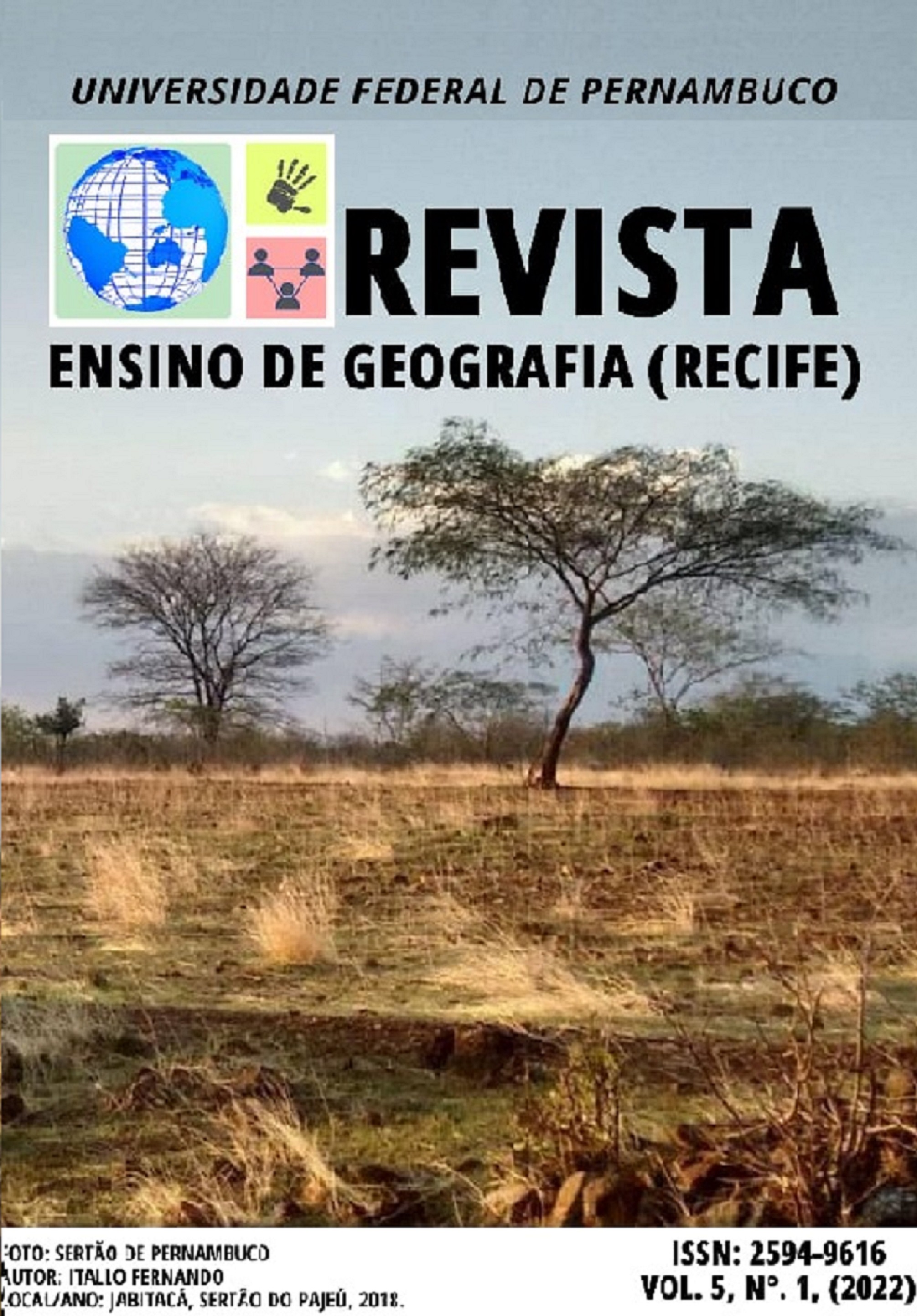The place of Carlinhos in the novel “menino de engenho”: teaching geography through a reading practice
DOI:
https://doi.org/10.51359/2594-9616.2022.250286Keywords:
Formative practice, Literary reading, Place, Teaching GeographyAbstract
The article is a report of a teaching practice in the initial training of geography teachers mediated by reading the novel “Menino de engenho”by José do Lins do Rego. The objective of the practicewas to promote the learning and meaning of the category of analysis place through the literaryspatial view of the students in the context of the narratives and the memories printed by Carlinhos, the main character of the novel. In continuity, the students' reading practice was aligned with the proposition of an exercise for suggestions of pedagogical strategies to mediate the teaching of place in school. The main result of this teaching practice was the problematization of school geography as one of the axes in the students' initial training, offering them the possibility to exercise and experience the pedagogical significance of specific geographic knowledge for the exercise of their profession. The results of this practice also print some challenges to be overcome by teacher educators, especially when they assume the role of mediator for the realization of teaching practices based on the use of literary texts.
References
ANDRADE, M. C. A terra e o homem no Nordeste: contribuição ao estudo da questão agrária no Nordeste. 8ª ed. São Paulo: Cortez, 2011. 334p.
CALVINO, Í. Contos fantásticos do século XIX. São Paulo: Companhia das Letras, 2004.
CALLAI, H. C. Estudar o lugar para compreender o mundo. p. 83-134. In: CASTROGIOVANNIO, A. C. (Org.). Ensino de Geografia: práticas e textualizações no cotidiano. 7ª ed. Porto Alegre: Editora Mediação, 2009. 176p.
CALLAI, H. C. Escola, cotidiano e lugar. p. 25-42. In: BUITONI, M. M. S (Org.). Geografia: ensino fundamental. Coleção Explorando o Ensino; Volume 22. Brasília: Ministério da Educação/Secretaria de Educação Básica, 2010. 252p.
CAVALCANTE JÚNIOR, F. Por uma escola do sujeito: O método (con)texto de letramentos múltiplos. 2ª edição. Fortaleza: Edições Demócrito Rocha, 2003.
CAVALCANTI, L. S. O lugar como espacialidade na formação do professor de Geografia: breves considerações sobre práticas curriculares. Rev. Bras. Educ. Geog., Rio de Janeiro, v. 1, n. 2, p. 01-18, jul./dez., 2011. Disponível em: <http://www.revistaedugeo.com.br/ojs/index.php/revistaedugeo/article/view/39> Acesso em: 20 mai. 2019.
COSSON, R. Letramento literário: teoria e prática. 1ª ed. São Paulo: Editora Contexto, 2006. 144p.
FREYRE, G. Nordeste: aspectos da influência da cana sobre a vida e a paisagem do Nordeste do Brasil. 7ª ed. São Paulo: Global, 2004. 255p.
MONTEIRO, C. A. F. O conteúdo geográfico nos espaços romanescos. Rev. C. &Trópico. Recife, v. 16, n. 2, p. 175-205, jul./dez., 1988. Disponível em: <https://periodicos.fundaj.gov.br/CIC/article/view/424/310> Acesso em: 05 mai. 2019.
REGO, J. L. Menino de engenho. 73ª ed. Rio de Janeiro: José Olympio, 1998. 88p.
SAMPAIO, A. Escritos do Ignoto – A literatura fantástica. p. 145-160. In: Netto, R. (Org.). Curso Literatura Cearense. Fortaleza: Fundação Demócrito Rocha, 2020. 192p.
Downloads
Published
How to Cite
Issue
Section
License
Copyright (c) 2022 Marcelo de Oliveira Moura

This work is licensed under a Creative Commons Attribution 4.0 International License.
Authors who publish with this journal agree to the following terms:- Authors retain copyright and grant the REVISTA ENSINO DE GEOGRAFIA (RECIFE) right of first publication with the work simultaneously licensed under a Creative Commons Attribution NonCommercial International 4.0 (CC BY-NC) that allows others to share the work with an acknowledgement of the work's authorship and initial publication in this journal.
- Authors are able to enter into separate, additional contractual arrangements for the non-exclusive distribution of the journal's published version of the work (e.g., post it to an institutional repository or publish it in a book), with an acknowledgement of its initial publication in this journal.
- Authors are permitted and encouraged to post their work online (e.g., in institutional repositories or on their website) prior to and during the submission process, as it can lead to productive exchanges, as well as earlier and greater citation of published work.



